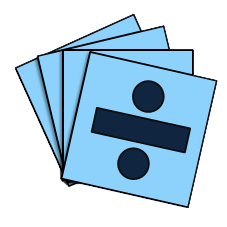Can You Make 100?
How many ways can you find to put in operation signs (+, −, ×, ÷) to make 100?
Problem
Can You Make 100? printable sheet
How many ways can you find to put operation signs ($+$, $-$, $\times$, $\div$) between the digits make $100$?
1 2 3 4 5 6 7 8 9 = 100




Getting Started
How close can you get with just adding?
Which sorts of calculations make the most difference?
Student Solutions
Well we had a lot of solutions sent in and here are just some that represent the kind of answers submitted.
$(1 + 2 + 3 + 4) \times 5 + 67 - ( 8 + 9 ) = 100$
$1+2+3+4+5=15$, $15\times6=90$, $90-7=83$, $83+8=91$, $91+9=100$
$1\times2+3=5$, $5\times4\times5+6= 106$, $106-7=99$, $99-8=91$, $91+9=100$
$(({8\times9}\div4)\times5) + ((7-6)+1)\times(3+2)) = 100$
$9\times8=72$, $1+2+3+4+5+6+7 = 28$, $72+28= 100$
$1+8=9$, $9\times9=81$, $81+6=87$, $87+3=90$, $90+2=92$, $92+7=99$, $99+5=104$, $104-4=100$
$5\times4=20$, $20\times3=60$, $60\times2=120$, $120-(4\times5)=100$
$(1+2+3-4)+5+6+78+9=100$
$1+2+3+4+5+6+7+(8\times9)=100$
$9\times7 = 63$, $63 + 6\times5 = 93$, $93 + 4 + 3= 100$
$(1 + (2 \times3) + (4 \times5) - 6) + 7 + (8 \times9) = 100$
$-1 \times 2 - 3 - 4 - 5 + 6\times7 + 8\times9 = 100$
$9\times6=54$, $54\times2=108$, $108-4-5=99$, $99+7=106$, $106-8=98$, $98-1=97$, $97+3=100$
$9\times8=72$, $72+7+1=80$, $80+4+6=90$, $90+5+2+3=100$
$9+1=10$, $10\times6=60$, $60+8+2=70$, $70+(7\times4)=98$, $98+5-3=100$
$1\times2+3=5$, $5\times4\times5-6=94$, $94+7+8-9=100$
$6\times4=24$, $24+1=25$, $25\times5=125$, $9+7=16$, $16+8=24$, $24-2=22$, $22+3=25$, $125-25=100$
$6+1=7$, $7\times7=49$, $9\times5=45$, $49+45=94$, $7+8=15$, $2+3+4=9$, $15-9=6$, $94+6=100$
$6+5=11$, $11\times7=77$, $4+3+9+8=24$, $24-2=22$, $22+1=23$, $77+23=100$
$6+7=13$, $13\times5=85$, $9+8=17$, $17-4=13$, $13+3=16$, $16-2=14$, $14+1=15$, $85+15=100$
$4+3=7$, $7\times9=63$, $8\times6=48$, $5\times2=10$, $48-10=38$, $38-1=37$, $63+37=100$
$4+5=9$, $9\times6=54$, $7x3=21$, $21+9=30$, $2\times8=16$, $30+16=46$, $46\times1=46$, $46+54=100$
$4+6=10$, $10\times7=70$, $7+8=15$, $15+9=24$, $24+5+2=31$, $31-1=30$, $70+30=100$
$4+7=11$, $11\times3=33$, $9\times6=54$, $8\times1=8$, $54+8=64$, $64+5=69$, $69-2=67$, $67+33=100$
$(1+9)(2+8)((7-3)\div4)(6-5) = 100$
$((1+2 + 3+4) \times (5+ 6)) + 7 - 8 - 9 = 100$
Here are some of the accounts that described the all-important processes that were used.
We started it by picking out two numbers and multiplied them together to get an answer and then we multiplied another pair of numbers to get an answer and added them together to get $87$ and added the remaining digits to get a subtotal of $100$. (Courtney and Michelle from Denfield Park Junior School)
We needed to get the biggest possible number so we multiplied the biggest numbers ($9$ and $8$). Then we added all the other numbers up in random order. We found we reached $100$ using every number.(Nadia and Millie, Greenacre School for Girls)
Our aim was to get to $50$ and double it, so we timesed $7$ by $9$ to get to $63$ and then minused it down to $60$ and then down to $50$. Then we timesed by $2$ to get $100$. (Karla and Gemma, Greenacre School for Girls)
We thought it would be good to start with number bonds to $10$. As we only had one $5$, we decided to use the other four number bonds to $10$ ($6 + 4$, $7 + 3$, $1 + 9$, $2 + 8$), and then use addition and subtraction to make $20$ and then times that by $5$ to get to $100$. (Maddie and Harriet A., Greenacre School for Girls)
Thank you to all involved - a splendid set of results!
Teachers' Resources
Why do this problem?
This problem offers great opportunities for mental arithmetic and estimation. It can also be used as an opening to discussing the order of operations.
Possible approach
Key questions
What operation might you use to make the result bigger?
Which numbers less than $100$ is it possible to make?
What other questions can you suggest?
Possible support
Possible extension
